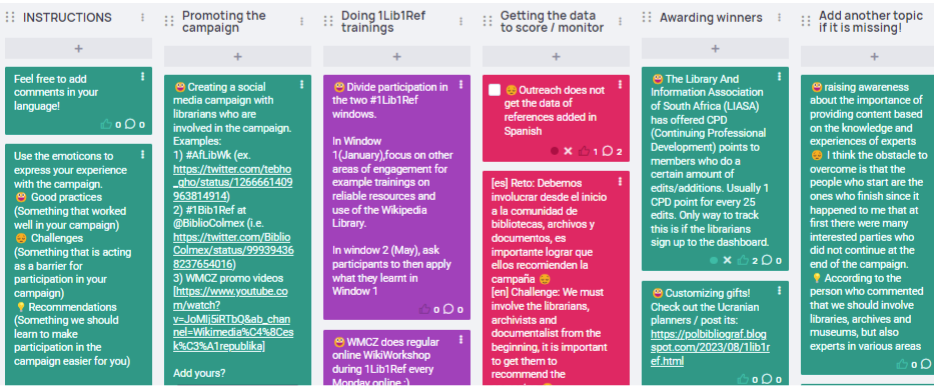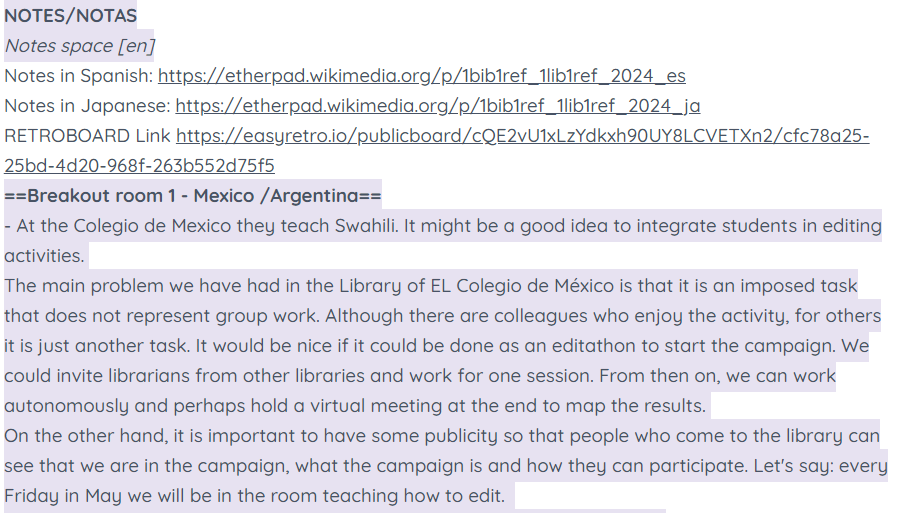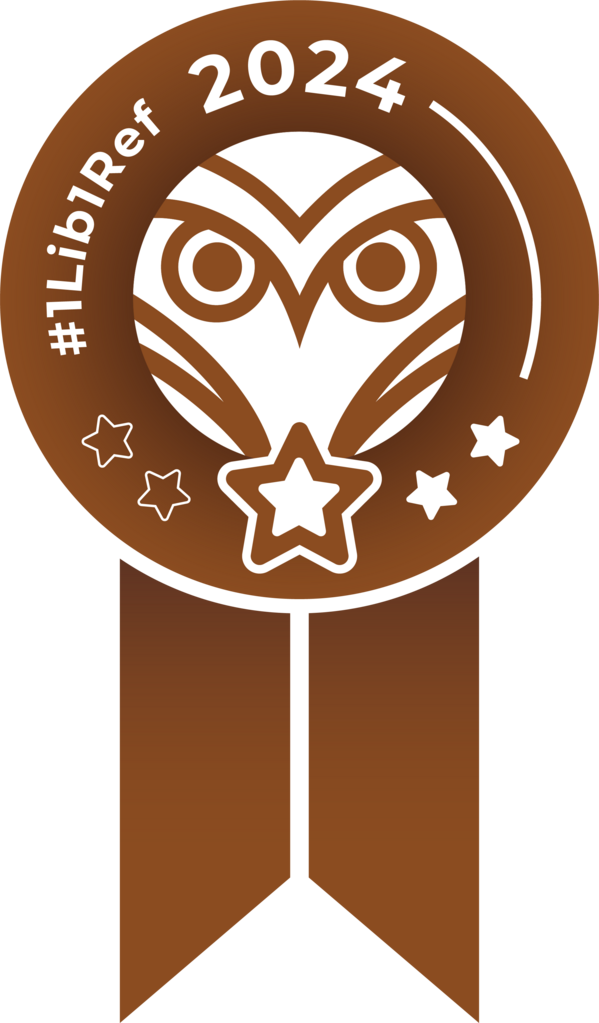Insights and Improvements
The #1Lib1Ref January Campaign of 2024 brought together librarians and Wikimedia community members from diverse backgrounds and experiences from at least 11 countries – Argentina, Colombia, the Czech Republic, Greece, Japan, Mexico, Poland, Serbia, South Africa, Romania, and the United States – fostering an opportunity for collaboration, learning, and reflection. If you were not part of this call, don’t worry; we will have other opportunities to connect (P.S. Check out the survey link in this post!). Meanwhile, let us look back on the Global Open Hour, to spotlight the successes achieved, the insight garnered, and the identified areas for improvement.
To this end, we sought to create different spaces to foster conversations: breakout rooms, Etherpads, and a Retroboard to reflect on the successes, barriers, and ideas for future collaboration.

Screenshot from the Global Open Hour’s retroboard
What Went Well
1. Feedback about Tools
Volunteers and organizers commonly use tools to track a campaign’s progress and measure the impact of contributions made during the campaign. While community members rely primarily on these tools, they face challenges incorporating them into their campaigns. We shared the collected feedback with the developers and volunteers who have been keeping these tools working:
- This Phabricator ticket contains the details of the reported #Hashtag Tool issue, and thanks to the collaborative work of Sam Walton, Jason Sherman, and Susana Cardenas Molinar, it’s alive again!
- In this Github issue, we reported the Citation Hunt a hiccup on Polish Wikipedia. In this other one, we raised the Washington D.C. community’s note that the tool suggested editing protected pages on Wikipedia (which discouraged new editors who could not add references to these pages). Thanks to its fantastic developer, Guilherme Gonçalves, both issues have been solved!
- Finally, this Phabricator ticket for Outreach Dashboard, documents the team’s generous response to the community’s need to get references counted for their languages. Thanks to Gabina Luz’s dedicated work, this wish is now a reality!
2. Building Community
The Global Open Hour provided a safe space for organizers and participants to connect, exchange experiences, and learn from one another. We wish to meet more often and learn together in the future. Don’t miss out on what we learned in the next section, and
2. Translation Support
Special thanks to Guillermo for providing translation support throughout the Global Open Hour. This effort ensured that language barriers did not get in the way of participation. Furthermore, we ensured that participants could take notes in their language and translate them afterward with DeepL. Feel free to make them better!

Key Learnings
- Understanding Different Realities:
Through breakout sessions and discussions, participants gained insights into the diverse realities librarians and editors face worldwide. For instance, in Poland, the Library Association was vital in making the call for action; in Argentina, despite the support of large institutions, employees did not find the activity engaging.
- Digital Literacy Skills Assessment:
Addressing varying proficiency levels is crucial for enabling librarians and (new) editors to leverage digital resources and tools effectively. This holds for #1Lib1Ref. In Romania and Colombia, starting to edit by adding references didn’t work. So they have and will opt for basic technical skills workshops instead.
- Building Alliances
This meeting made clear there is no fit-all recipe but different realities. However, buy-in for librarian participation was essential for many affiliates. For instance, the group in Greece has done the campaign five years in a row. This stable cooperation is very much related to their collaboration with academic libraries, which have seen the #1Lib1Ref training as a synergetic move to train their students on using resources. The affiliate in Romania found the collaboration with the National Library especially fruitful.
- Recognizing Labor
Much love and interest was shared for Wikimedia Czech Republic’s #1Lib1Ref badges. How could you not? Look at that cute owl and that open license that allows you to reuse it!

Many were surprised by how the Library and Information Association of South Africa (LIASA) has offered Continuing Professional Development (CPD) points to members who make certain edits/additions. Usually, 1 CPD point is awarded for every 25 edits. Others were interested in how Wikimedia Serbia has been using the Hashtags Tool to keep track of its impressive stats!
Things to consider in the future
- Enhanced Facilitation:
Local organizers with solid facilitation skills could take the lead in optimizing breakout sessions. Adequate note-taking support ensures that valuable insights and discussions are captured effectively. One possibility is to organize such Global Open Hours within the Let’s Connect program or with the help of the community of organizers. Let us know what you would like to learn or facilitate by filling out this survey.
- Improved Tool Facilitation:
Tools like EasyRetro may require additional facilitation to maximize their effectiveness. Providing guidance and support can help participants navigate these platforms more efficiently.
- Centralized Resource Space:
Creating a centralized space to share resources, stories, and best practices can facilitate knowledge exchange and collaboration beyond the campaign’s duration. A comprehensive repository ensures valuable insights and resources are easily accessible to all participants. We have started gathering some resources on this “How to:1Lib1Ref” page and in the “Participate” section of 1Lib1Ref’s page, but we’re looking forward to revamping #1Lib1Ref’s Meta page, so let us know if you’re interested in writing an email to gorana.gomirac@vikimedija.org or adding a note in the discussion page!
Conclusion
During the session, we gained valuable insights into various aspects of the projects and the support we may require to continue further collaboration between #1lib1ref organizers and participants. By understanding these lessons, we can better navigate future endeavors and evolve collectively.
As we move forward, help us build upon these insights to create more inclusive, effective, and impactful campaigns in the future!

Can you help us translate this article?
In order for this article to reach as many people as possible we would like your help. Can you translate this article to get the message out?
Start translation